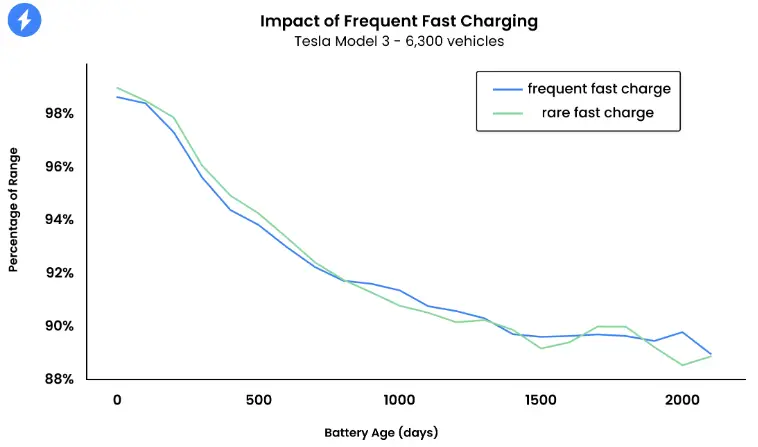Most electric vehicles support fast charging. A general misconception is that fast charging degrades battery life faster than other charging modes.
Is that true? Is fast charging bad? Is fast charging bad for batteries? This article provides the answer.
Lithium-ion batteries degrade over time, and that’s a general phenomenon. How much the battery will degrade is an altogether different discussion, as it also depends on how you charge your batteries.
If you follow the best practices, you can expect up to 5% degradation per year.
Before we learn about “Is fast charging bad for the battery or not?”, we need to understand the different ways of charging a battery.
How Does Battery Charging Work?
There are two types of charging available for EV batteries: AC charging and DC charging. Please note that the batteries can only take DC power.
So when you use an AC charger, the vehicle’s inbuilt converter will convert the AC power to DC power and then charge the battery.
Indian households get AC single-phase power with a 230V and 50Hz frequency. When you use a portable charger (even your mobile phone charger), it converts the AC power to DC power and then charges the battery.
On the flip side, DC charging is fast, as it operates on a high voltage range and does not need to convert from AC to DC.
Please note that AC charging communicates with the onboard charger / portable charger, but DC charging communicates directly with the Battery Management System (BMS).
The BMS can control the voltage and current flowing into the battery to keep these parameters under safe limits.
There are three types of charging levels for EVs.
- Level -I Charging (AC): Up to 120V
- Level-II Charging (AC): Up To 230V
- Level-III Charging (DC): Above 400V
You can see that DC charging operates above 400V, so it will definitely be fast. You may wonder if regular DC charging may damage EV batteries. Is that the case? Let’s find out.
Is Fast Charging Bad For Batteries?
If we consider degradation, fast charging impacts batteries. However, the impact is minimal compared to slow AC charging.
This means batteries will degrade both in AC charging and DC charging, but the degradation will be a little more in the case of DC charging.
A study by the Idaho National Laboratory on Nissan Leaf cars throughout 50000 miles reveals that level 2 AC charging degrades the battery by 24.5%, whereas the cars using the DC charging get battery degradation of 27%.
That’s a marginal difference of 2.5% for 50000 miles. Does that make any sense, not to use DC charging, fearing battery degradation?
Similar studies conducted by Recurrent Motors suggest that batteries do not noticeably degrade if we use DC charging regularly.
EV batteries are smart enough nowadays to control different parameters that could eventually spoil them if they are not operating under safety limits.

Another beauty of DC charging is that it does not generate as much heat as AC charging does. Generally, we have the misconception that DC charging generates a lot of heat. But that’s not true. It’s AC charging that generates more heat.
Studies reveal that heat is the battery’s biggest enemy. DC charging and the battery management system control heat very well.
So DC charging is not bad, nor does it drastically degrade your battery. 2.5% more degradation than normal AC charging is negligible for a battery that was used for over 50,000 miles, which is almost one-fourth the lifecycle of an electric vehicle.
Conclusion: Is Fast Charging Bad For Batteries?
Fast Charging or Direct Current Fast Charging (DCFC) is not bad for batteries. It’s true that if you use DC charging for a prolonged time, your batteries might degrade more, but that is very marginal compared with AC charging.
Consider saving 80% of the time charging your battery using a DC charger and sacrificing 2.5-5% more battery degradation. It’s a nice tradeoff, though: save 80% of time or lose 2.5% more battery capacity.